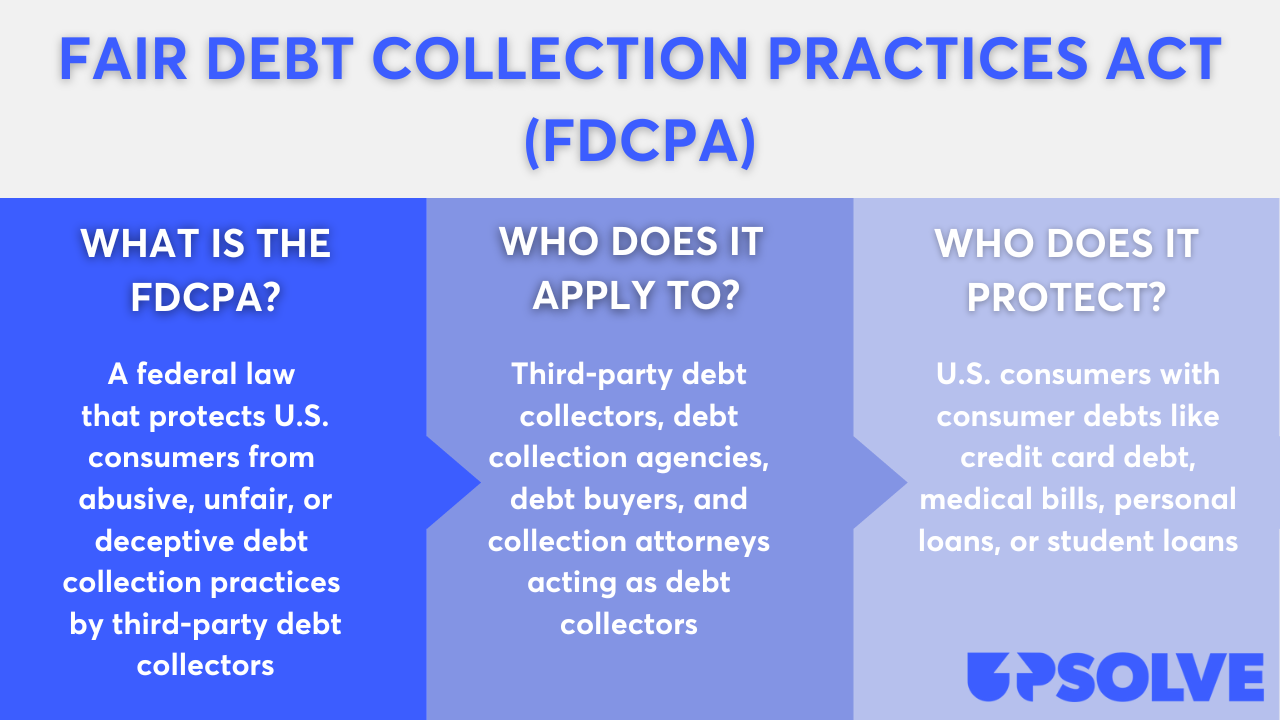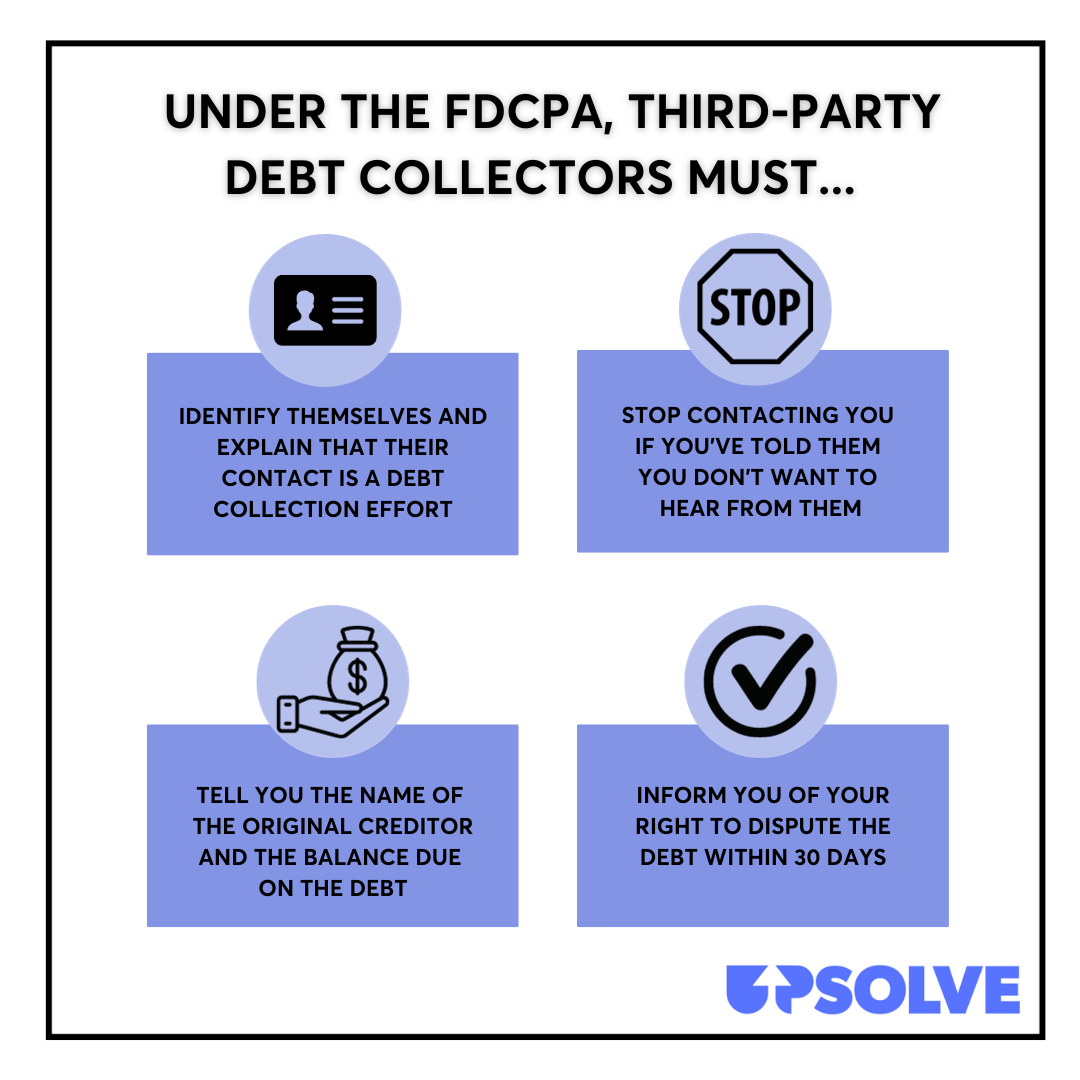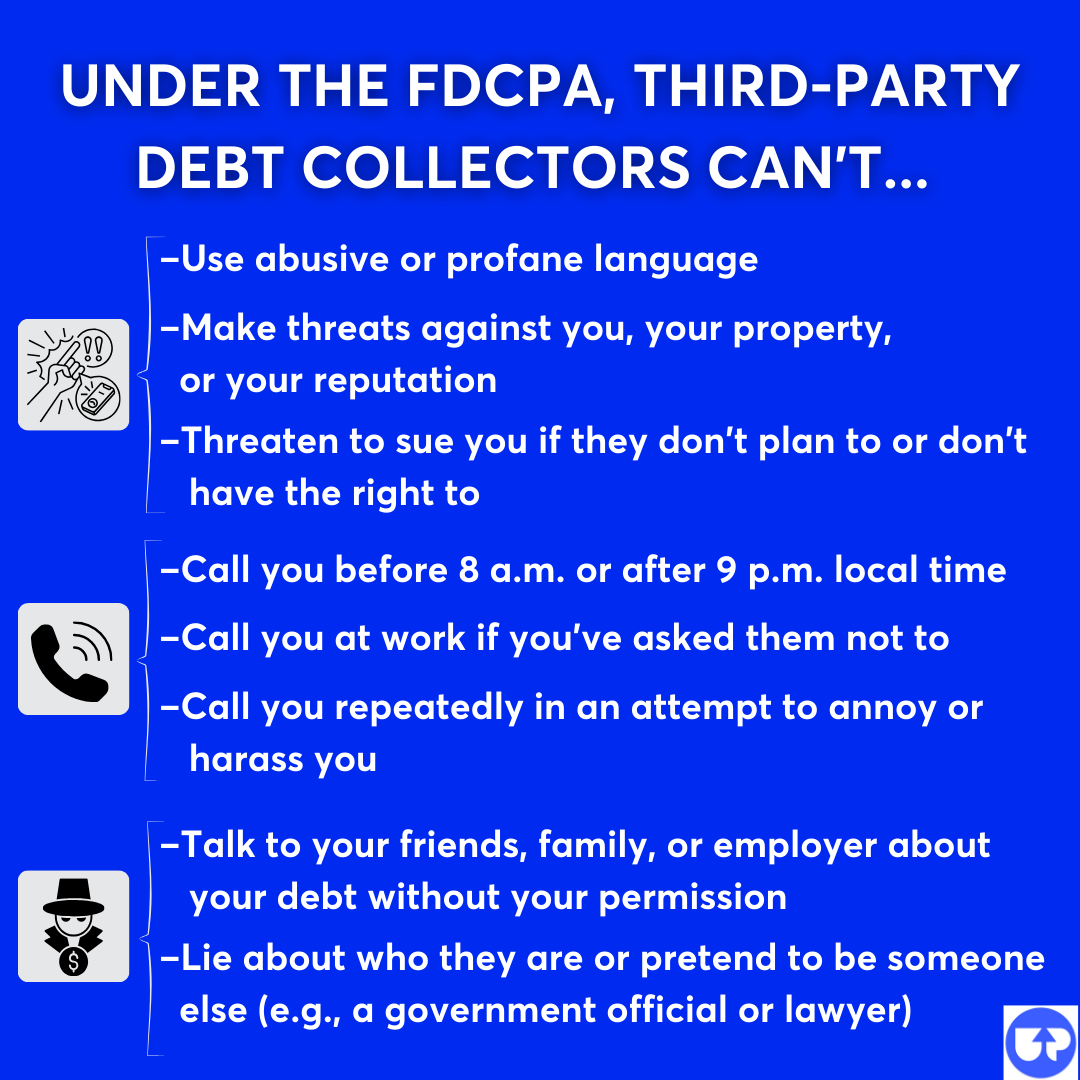Your Guide to Washington’s Debt Collection Laws
Upsolve is a nonprofit that helps you eliminate your debt with our free bankruptcy filing tool. Think TurboTax for bankruptcy. You could be debt-free in as little as 4 months. Featured in Forbes 4x and funded by institutions like Harvard University — so we’ll never ask you for a credit card. See if you qualify →
Washington has two state debt collection laws: the Washington Collection Agency Act (CAA) and the Washington Consumer Protection Act (CPA). Combined, these two laws provide important protections for state residents against original creditors, third-party debt collectors, and debt buyers. Washington residents get further protection from the federal Fair Debt Collection Practices Act (FDCPA). The statute of limitations for credit card debt and medical bills in Washington state is six years.
Written by Ben Jackson. Legally reviewed by Jonathan Petts
Updated January 22, 2026
Table of Contents
- What Are the Debt Collection Laws in Washington?
- Washington Provides Additional Protections Beyond the FDCPA
- What Can You Do if a Debt Collector Breaks the Law in Washington?
- What Is the Statute of Limitations for Debt Collection in Washington?
- What Can Debt Collectors Do To Collect Debt in Washington?
- Need Help With Debt Relief? Here Are Some Options
What Are the Debt Collection Laws in Washington?
Washington has two state laws regarding debt collection: the Washington Collection Agency Act (CAA) and the Washington Consumer Protection Act (CPA).
Washington Collection Agency Act (CAA)
The Washington Collection Agency Act outlines collection practices are prohibited and defines what makes an act or practice unprofessional by a collection agency.
This act applies to third-party debt collectors (including original creditors if they handle their collections under a different, fictitious name) and debt buyers. It doesn’t apply to original creditors who handle collections under the same name or billing/servicing companies that only send account notices on behalf of a creditor or collector.
The CAA outlines the state’s licensing requirement for collection agencies and establishes a list of additional rules and requirements that debt buyers must follow if they attempt to sue debtors.
The act’s language follows the protections in the Fair Debt Collection Practices Act (FDCPA) and the related federal debt collection rule, though there are some differences. (More on the FDCPA below.)
Washington Consumer Protection Act (CPA)
The Washington Consumer Protection Act states that any unfair or deceptive acts practiced by collection agencies are unlawful. This law provides Washington state consumers with the right to sue debt collectors in civil court.
Federal Fair Debt Collection Practices Act (FDCPA)
Both Washington state laws work alongside the Fair Debt Collection Practices Act (FDCPA). This federal law protects consumers from harassment and abusive debt collection practices. Every citizen in Washington is protected under the FDCPA.
Here’s an overview of this federal law:

The main purpose of the FDCPA is to provide protections for consumers against third-party debt collectors. It also outlines what debt collectors are allowed to do:

In addition to outlining what debt collectors can do, the FDCPA outlines what third-party debt collectors can’t do:

Washington Provides Additional Protections Beyond the FDCPA
Not every state provides protections beyond the FDCPA for its residents. Washington, however, does provide additional protections beyond the FDCPA.
Washington Limits Debt Collectors Contact
For one, Washington limits the amount of contact a debt collector can make. The state defines harassment as:
Communicating more than three times in a single week
Calling or texting a number they know is a cellphone more than twice a day
Contacting you at work more than once a week
If you contact the collector first and they respond to your initial contact, their response doesn’t count toward these limits.
Washington Provides Additional Protections for Medical Debt
The state also provides additional protections for medical debt. The Washington Collection Agency Act contains additional requirements for debt collectors who are attempting to collect medical debt.
For a medical debt, the validation notice info must state that:
You have the right to ask for the original account number.
You have the right to ask for the date of your last payment.
You have the right to request an itemized statement that includes:
The medical creditor's name and address
The dates of service and a list of services the provider claims it provided you
The amount of principal owed on the debt
Any adjustments made to the bill
The amount of any payments from you or anyone else
Any interest or fees
Eligibility information for Charity Care and information about any Charity Care payments that were applied to the debt
Debt collectors may not report information about medical debt to a credit bureau for at least 180 days from the date the collection agency received the information about the debt.
WashingtonLawHelp.org and the Northwest Justice Project have created a comprehensive guide for dealing with medical debt in Washington State.
Washington Requires Additional Steps When a Debt Buyer Sues You
Debt lawsuits have become increasingly common in recent years. In Washington, if a debt buyer files a lawsuit against you, they must attach a copy of the contract for the debt that shows your signature.
If the debt wasn’t backed by a signed contract, the debt buyer must instead attach a copy of the most recent transaction statement in which you took an action (made a payment or a purchase) and a copy of the account terms and conditions.
They must also include a disclosure in the complaint, in font no smaller than 10-point type, stating each of the following:
That the action is being brought by, or for the benefit of, a person or entity that is engaged in the business of purchasing delinquent or charged-off claims for collection purposes
The date the claim or obligation was purchased
The identity of the person or entity from whom or which the claim or obligation was purchased
That the plaintiff may have purchased this claim or obligation for less than the value stated in the complaint
If the claim or obligation was at any time sold without any representation or warranty of accuracy, a statement to that effect
That the action is being commenced within, and is not barred by, an applicable statute of limitations
If you don’t respond to the lawsuit or show up to your court date, the debt buyer can’t get a default judgment against you unless they meet the requirements above and also provide evidence that establishes:
The amount and nature of the debt
The original account number at charge-off
The original creditor at charge-off
The amount due at charge-off, including the principal, interest, fees, and any other charges or reductions
An itemization of post-charge-off additions
The date of the last payment (or the date of the last transaction)
If the account is not a revolving credit account, the date the debt was incurred
Evidence proving that the debt buyer owns the debt
What Can You Do if a Debt Collector Breaks the Law in Washington?
If you think a debt collector has violated either of Washington’s debt collection laws, you can:
Submit a complaint to the Washington State Department of Licensing
File a complaint with the Washington Attorney General’s Office
File a civil lawsuit against the debt collector
How To Bring a Civil Lawsuit Against a Debt Collector
If a debt collector breaks state laws, you can sue them in a state civil court. If you win the case, you may be eligible for compensation including actual damages, punitive damages, court costs, and attorney fees.
The court may also choose to award up to three times the amount of your actual damages (so long as that doesn’t exceed $25,000). Actual damages are real losses or harm you suffered due to the violation. There is no state cap on punitive damages.
That said, you don’t need to have suffered actual damages to sue a debt collector under the CPA. If the collector’s actions or practices are harmful to the public because they violate state laws, you can sue them. In this case, you won’t be awarded damages, but you can get a court order for the collector to stop the violation and you can recover your attorneys fees and costs.
What Is the Statute of Limitations for Debt Collection in Washington?
Statutes of limitations are state laws that limit the time a debt collector has to bring a lawsuit.
After the statute of limitations has passed, debt collectors can still sue you, but you'll have a strong defense in the lawsuit.
| Type of Debt | Statute of Limitations |
|---|---|
| Written Contracts (usually includes medical debt and credit card debts) | 6 years |
| Oral Contracts | 3 years |
| Open Accounts | 6 years |
| Auto Loans | 4 years |
| State Tax | 4 years |
| Judgments | 10 years |
In most cases, the clock starts ticking when there’s a breach of contract. This is usually the date of the last payment you made on the debt.
If you make a payment on the account, promise to make a payment, or otherwise acknowledge the debt within the statute of limitations period, the time period can be restarted. But if the statute of limitations has expired, then a payment, promise to repay, or acknowledgment of the debt won’t restart it. A promise or acknowledgment only restarts the clock if you make it in writing and sign it.
What Can Debt Collectors Do To Collect Debt in Washington?
In order to protect yourself, it’s important to know what debt collectors can legally do to collect debt in your state. Debt collectors will start with phone calls and letters, but this can escalate.
Debt Collectors Can Garnish Your Wages (With a Court Order)
Debt collectors can take you to court for an unpaid debt — this is called a debt collection lawsuit. If you get sued by a collection agency and lose, the judge will issue a court order called a judgment to the collector. This allows the debt collector to get an order for wage garnishment, a bank levy, or a property lien.
Wage garnishment orders are the most common. Wage garnishment allows a creditor or debt collector to take money directly from your paycheck. Washington state law limits how much a debt collector or creditor can take from each paycheck.
Debt Collectors Can Repossess Your Car
If you don’t make your car payments on time, the lender can legally repossess the vehicle. They aren’t required to give you prior notice, and they don’t need a court order to do this. If you default on your auto loan, you’re at risk of repossession. This could happen after only one missed payment, so it’s important to review your auto loan contract to understand your terms.
Need Help With Debt Relief? Here Are Some Options
If you are weighed down by debt, you may not know where to begin to address it. Please know it is completely normal to feel overwhelmed. If you’re not sure where to start, consider scheduling a free consumer credit counseling session with an accredited nonprofit counselor.
A counselor might suggest a debt management plan, debt consolidation, or bankruptcy.
Bankruptcy is a powerful legal tool that gives you the power to reclaim your finances. If your debt has become unmanageable and you’re looking for a fresh start, filing bankruptcy may be a good option. Filing bankruptcy also stops all collection efforts, including wage garnishment orders against you.
If you’re looking to file Chapter 7 bankruptcy, you may be able to use Upsolve’s free online filing tool. It walks you through the Chapter 7 process so you can file on your own with confidence.
Looking for Legal Help?
WashingtonLawHelp.org has self-help guides, online resources, and a comprehensive legal aid directory with links to local and statewide resources.
King County Bar Association provides free legal clinic aid to low-income King County residents.
Washington State Bar Association has an online hub with links to local and statewide legal aid resources.
Northwest Justice Project provides legal assistance to low-income residents statewide.
Washington Pro Bono Council connects residents to legal aid resources and providers in their area.